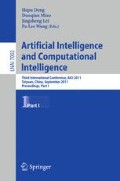Abstract
Based on humanity, efficiency and maintainability of the intelligent design requirement, this article presents a novel game intelligent decision-making method through comparing with the other intelligent decision-making methods. The NPCs perception and decision-making process were respectively illustrated from two aspects-bounded rationality and satisfactory criterion, which are the core characteristics of the bounded rationality model. And the introduced criterions overcome the drawback concerning the ’perceived blind spot’ by the perception sensitivity and enhance the intelligence by the utility function. Finally, it verifies the advantages of this method by the intelligent football battle platform.
Access this chapter
Tax calculation will be finalised at checkout
Purchases are for personal use only
Preview
Unable to display preview. Download preview PDF.
References
Millington, I., Funge, J.: Artificial Intelligence for Games, 2nd edn., pp. 427–459. Morgan Kaufmann Publishers, San Francisco (2009)
Orkin, J.: Applying Goal-Oriented Action Planning to Games. Charles River Media. AI Game Programming Wisdom, 2217–2229 (2003)
Orkin, J.: Three states and a plan: the AI of FEAR. In: Proceeding of the 2006 Game Developers Conference (GDC 2006), pp. 41–46 (2006)
Prieditis, A., Dalal, M.: Applying Model-Based Decision-Making Methods to Games: Applying the Locust AI Engine to Quake III. Course Technology, 211–222 (2006)
Harbert, S.: Administrative Behavior: A Study Of Decision Making Processes In Administrative Organization. Macmillan Publishing Co. Inc., New York (1971)
Wandell, B.: Foundations of Version. Sinauer Associates (1995)
Wang, Q.: Modeling a class of bounded rationality and decision analysis method. Huazhong University Doctoral Dissertation (2009)
Russell, S., Norvig, P.: Artificial Intelligence.: A Modern Approach, 3rd edn., pp. 610–626. Prentice Hall, Englewood Cliffs (2010)
Buckland, M.: Programming Game AI by Example. Wordware Publishing (2005)
Author information
Authors and Affiliations
Editor information
Editors and Affiliations
Rights and permissions
Copyright information
© 2011 Springer-Verlag Berlin Heidelberg
About this paper
Cite this paper
Zhou, Q., Gao, C., Meng, Z. (2011). The Bounded Rationality Model-Based Game Intelligent Decision-Making Method. In: Deng, H., Miao, D., Lei, J., Wang, F.L. (eds) Artificial Intelligence and Computational Intelligence. AICI 2011. Lecture Notes in Computer Science(), vol 7002. Springer, Berlin, Heidelberg. https://doi.org/10.1007/978-3-642-23881-9_9
Download citation
DOI: https://doi.org/10.1007/978-3-642-23881-9_9
Publisher Name: Springer, Berlin, Heidelberg
Print ISBN: 978-3-642-23880-2
Online ISBN: 978-3-642-23881-9
eBook Packages: Computer ScienceComputer Science (R0)

